| Listing 1 - 10 of 14 | << page >> |
Sort by
|
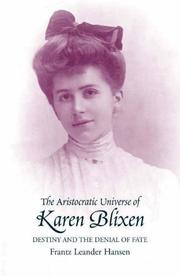
ISBN: 1903900328 Year: 2003
Abstract | Keywords | Export | Availability | Bookmark
 Loading...
Loading...Choose an application
- Reference Manager
- EndNote
- RefWorks (Direct export to RefWorks)
Book
ISBN: 0191861758 1282948148 9786612948145 0820337323 9780820337326 9780191861758 9780820335728 082033572X 0820346020 Year: 2011 Publisher: Athens [Ga.] : University of Georgia Press,
Abstract | Keywords | Export | Availability | Bookmark
 Loading...
Loading...Choose an application
- Reference Manager
- EndNote
- RefWorks (Direct export to RefWorks)
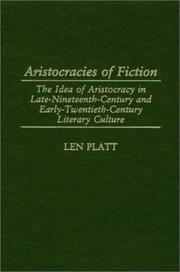
ISBN: 0313316732 Year: 2001 Publisher: Portsmouth Greenwood
Abstract | Keywords | Export | Availability | Bookmark
 Loading...
Loading...Choose an application
- Reference Manager
- EndNote
- RefWorks (Direct export to RefWorks)
Aristocracy (Social class) in literature --- English literature --- Literature and society --- History and criticism --- History
Book
ISBN: 3031411412 3031411404 Year: 2023 Publisher: Cham, Switzerland : Palgrave Macmillan,
Abstract | Keywords | Export | Availability | Bookmark
 Loading...
Loading...Choose an application
- Reference Manager
- EndNote
- RefWorks (Direct export to RefWorks)
Science, Medicine, and Aristocratic Lineage in Victorian Popular Fiction explores the dialogue between popular literature and medical and scientific discourse in terms of how they represent the highly visible an pathologized British aristocratic body. This books explores and complicates the two major portrayals of aristocrats in nineteenth-century literature: that of the medicalised, frail, debauched, and diseased aristocrat, and that of the heroic, active, beautiful ‘noble’, both of which are frequent and resonant in popular fiction of the long nineteenth century. Abigail Boucher argues that the concept of class in the long nineteenth century implicitly includes notions of blood, lineage, and bodily ‘correctness’, and that ‘class’ was therefore frequently portrayed as an empirical, scientific, and medical certainty. Due to their elevated and highly visual social positions, both historical and fictional aristocrats were frequently pathologized in the public mind and watched for signs of physical excellence or deviance. Using popular fiction, Boucher establishes patterns across decades, genres, and demographics and considers how these patterns react to, normalise, or feed into the advent of new scientific and medical understandings.
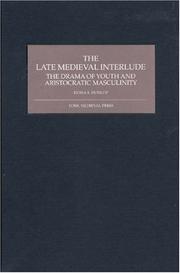
ISBN: 1903153212 9786612185571 1282185578 1846155614 Year: 2007 Publisher: [Woodbridge, Suffolk, UK?] : York Medieval Press,
Abstract | Keywords | Export | Availability | Bookmark
 Loading...
Loading...Choose an application
- Reference Manager
- EndNote
- RefWorks (Direct export to RefWorks)
Sensitive study of the 15/16 century interlude, focussing on one of its major concerns, the depiction of male aristocracy and the development to maturity. The commercial theatre of the late sixteenth century is often credited with introducing its audiences to new modes of thought about the self, society and the nation, making them conscious that the self is performed, as an actor performs a role. Yet the earlier interlude drama, originally performed in households and other institutions of the late fifteenth and sixteenth centuries, indicates that the late medieval period was fully aware of the theatricality of identity. This book argues that ideas of performance inform the concepts of aristocratic masculinity developed in the plays 'Nature', 'Fulgens and Lucres', 'The Worlde and the Chylde', 'The Interlude of Youth' and 'Calisto and Melebea'. It examines how the depiction of young male aristocrats in these texts is shaped by ideas of male youth constituted in the middle ages, and shows them as failing or succeeding to perform an adult noble masculinity in the aristocratic body and in aristocratic household. The book also suggests ways in which the plays offer discreet praise and censure of the manner in which their noble patrons performed as aristocrats. Throughout, it brings out the subtle qualities of the interludes, which, the author shows, have been unjustly neglected. Dr FIONA S. DUNLOP is Research Associate of the Centre for Medieval Studies, University of York
Aristocracy (Social class) in literature. --- Drama --- Interludes. --- Young men in literature. --- History and criticism. --- Drama, Modern --- Dramas --- Dramatic works --- Plays --- Playscripts --- Stage --- Literature --- Dialogue --- Aristocracy in literature --- Philosophy
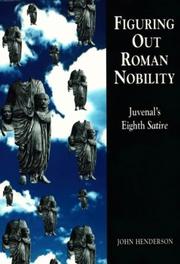
ISBN: 0859895173 Year: 1997 Publisher: Exeter University of Exeter press
Abstract | Keywords | Export | Availability | Bookmark
 Loading...
Loading...Choose an application
- Reference Manager
- EndNote
- RefWorks (Direct export to RefWorks)
Aristocracy (Social class) in literature --- Families in literature --- Nobility in literature --- Nobility --- Verse satire, Latin --- History and criticism --- Juvenal. --- Rome --- In literature.
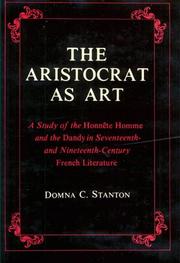
ISBN: 0231039034 Year: 1980 Publisher: New York Columbia University Press
Abstract | Keywords | Export | Availability | Bookmark
 Loading...
Loading...Choose an application
- Reference Manager
- EndNote
- RefWorks (Direct export to RefWorks)
Aristocracy (Social class) in literature --- Dandies in literature --- Didactic literature, French --- French literature --- Social ethics in literature --- 391 --- CDL --- Aristocracy in literature --- History and criticism --- Thematology --- anno 1600-1699 --- anno 1800-1899
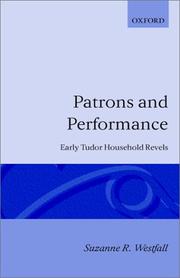
ISBN: 0198128800 0191671703 Year: 1990 Publisher: Oxford Clarendon
Abstract | Keywords | Export | Availability | Bookmark
 Loading...
Loading...Choose an application
- Reference Manager
- EndNote
- RefWorks (Direct export to RefWorks)
Theatrical science --- anno 1500-1599 --- Great Britain --- 820-2 "15" --- Amateur theater --- -Aristocracy (Social class) in literature --- Nobility --- -Theater --- -Authors and patrons --- -Literary patronage --- Maecenatism --- Patronage of literature --- Sponsorship of literature --- Art patronage --- Literary patrons --- Literature and state --- Dramatics --- Histrionics --- Professional theater --- Stage --- Theatre --- Performing arts --- Acting --- Actors --- Noble class --- Noble families --- Nobles (Social class) --- Peerage --- Upper class --- Aristocracy (Social class) --- Titles of honor and nobility --- Aristocracy in literature --- Amateur plays --- Amateur theatricals --- Nonprofessional theater --- Women in amateur theatricals --- Amusements --- Theater --- Little theater movement --- Engelse literatuur: toneel; drama--?"15" --- History --- -History --- -History and criticism --- -Engelse literatuur: toneel; drama--?"15" --- -820-2 "15" --- Aristocracy (Social class) in literature --- Authors and patrons --- History and criticism
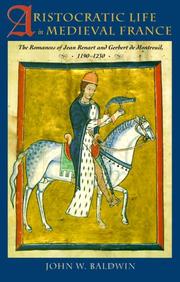
ISBN: 0801861888 0801869129 9780801861888 9780801869129 Year: 2000 Publisher: Baltimore Johns Hopkins university press
Abstract | Keywords | Export | Availability | Bookmark
 Loading...
Loading...Choose an application
- Reference Manager
- EndNote
- RefWorks (Direct export to RefWorks)
Modern historians have generally approached the study of medieval society through chronicles, charters, and other documents composed in Latin by members of the clergy. Although these records may be satisfactory for studying the affairs of ecclesiastics, kings, and high barons, they are inadequate for assessing the major preoccupations of the aristocracy -- living extravagantly, fighting, making love, entertaining, eating and dressing ostentatiously, and, generally, earning the disapproval of the clergy. In 'Aristocratic Life in Medieval France', the respected medieval scholar John Baldwin undertakes a study of this segment of society using, for the first time in nearly a century, the vernacular romances written exclusively for the amusement of aristocratic audiences. Rather than attempting to encompass all of Middle Age Europe, this study selects two writers, Jean Renart and Gerbert de Montreuil, and their four romances. It focuses with depth and specificity on the discrete area of northern France during a precise period, 1190--1230. Since Jean and Gerbert framed their fictional stories with contemporary and realistic features that could be recognized by their audiences, their works provide a wealth of detail on aristocratic living. Employing such literary techniques as "reality effects" and "horizons of expectations," Baldwin successfully discerns the historical content in these romance narratives.
Aristocracy (Social class) --- Literature and society --- Aristocracy (Social class) in literature --- Romances --- History --- History and criticism --- Jean Renart, --- Gerbert, --- Political and social views --- Aristocracy (Social class) in literature. --- Political and social views. --- History and criticism. --- Jean Renart, - 12th/13th cent. - Political and social views. --- Gerbert, - de Montreuil, - 13th cent. - Political and social views. --- Aristocracy (Social class) - France - History - To 1500. --- Literature and society - France - History - To 1500. --- Aristocracy (Social class) - France - History - To 1500 --- Literature and society - France - History - To 1500 --- Romances - History and criticism --- Jean Renart, - 12th/13th cent. - Political and social views --- Gerbert, - de Montreuil, - 13th cent. - Political and social views --- Jean Renart, - 12th/13th cent. --- Gerbert, - de Montreuil, - 13th cent.
Book
ISBN: 3825312348 Year: 2001 Volume: 302 Publisher: Heidelberg : Universitätsverlag C. Winter,
Abstract | Keywords | Export | Availability | Bookmark
 Loading...
Loading...Choose an application
- Reference Manager
- EndNote
- RefWorks (Direct export to RefWorks)
This study suggests that Chaucer's poetic consciousness was shaped largely by the state formation process and the concomitant transformation of the aristocracy and rise of a class of educated state functionaries, the 'clerks'. Belonging neither to the 'clerks' nor to the courtly aristocracy proper, Chaucer sought to create a realm of pure poetry, a realm that his 'clerky' fellow-poets Gower, Usk, Scogan and Hoccleve were determined to erase even as they celebrated Chaucer as England's principal poet. The struggle between Chaucer and the clerks attempting to appropriate him unfolds not only in contemporary literature but also in the pictorial images of the poet circulating after his death.
Aristocracy (Social class) in literature --- Aristocratie (Classe sociale) dans la littérature --- Aristocratie (Sociale klasse) in de literatuur --- Classes sociales dans la littérature --- Cours et courtisans dans la litterature --- Courts and courtiers in literature --- Hoven en hofhoudingen in de literatuur --- Social classes in literature --- Sociale klassen in de literatuur --- Aristocracy (Social class) in literature. --- Clerks --- Courts and courtiers in literature. --- English poetry --- Literature and society --- Literature and state --- Politics and literature --- Social classes in literature. --- Attitudes. --- History and criticism. --- History --- Chaucer, Geoffrey, --- Contemporaries. --- Political and social views. --- Great Britain --- Politics and government --- Chaucer, Geoffrey --- Political and social views --- Contemporaries --- Middle English, 1100-1500 --- History and criticism --- To 1500 --- Attitudes --- 1066-1485
| Listing 1 - 10 of 14 | << page >> |
Sort by
|

 Search
Search Feedback
Feedback About UniCat
About UniCat  Help
Help News
News